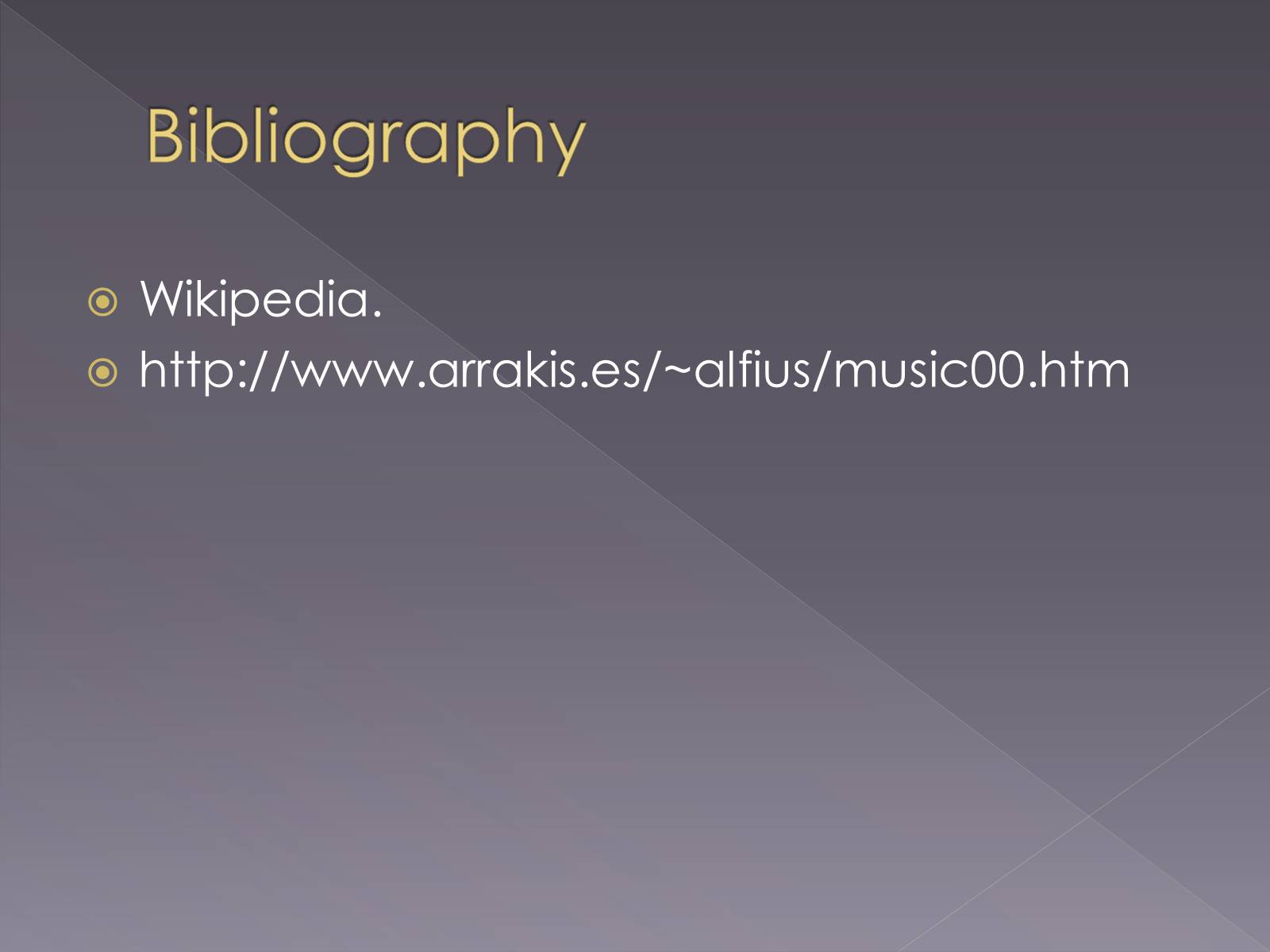- Головна
- Готові шкільні презентації
- Презентація на тему «Alexander Fleming» (варіант 1)
Презентація на тему «Alexander Fleming» (варіант 1)
400
Слайд #1
Alexander Fleming
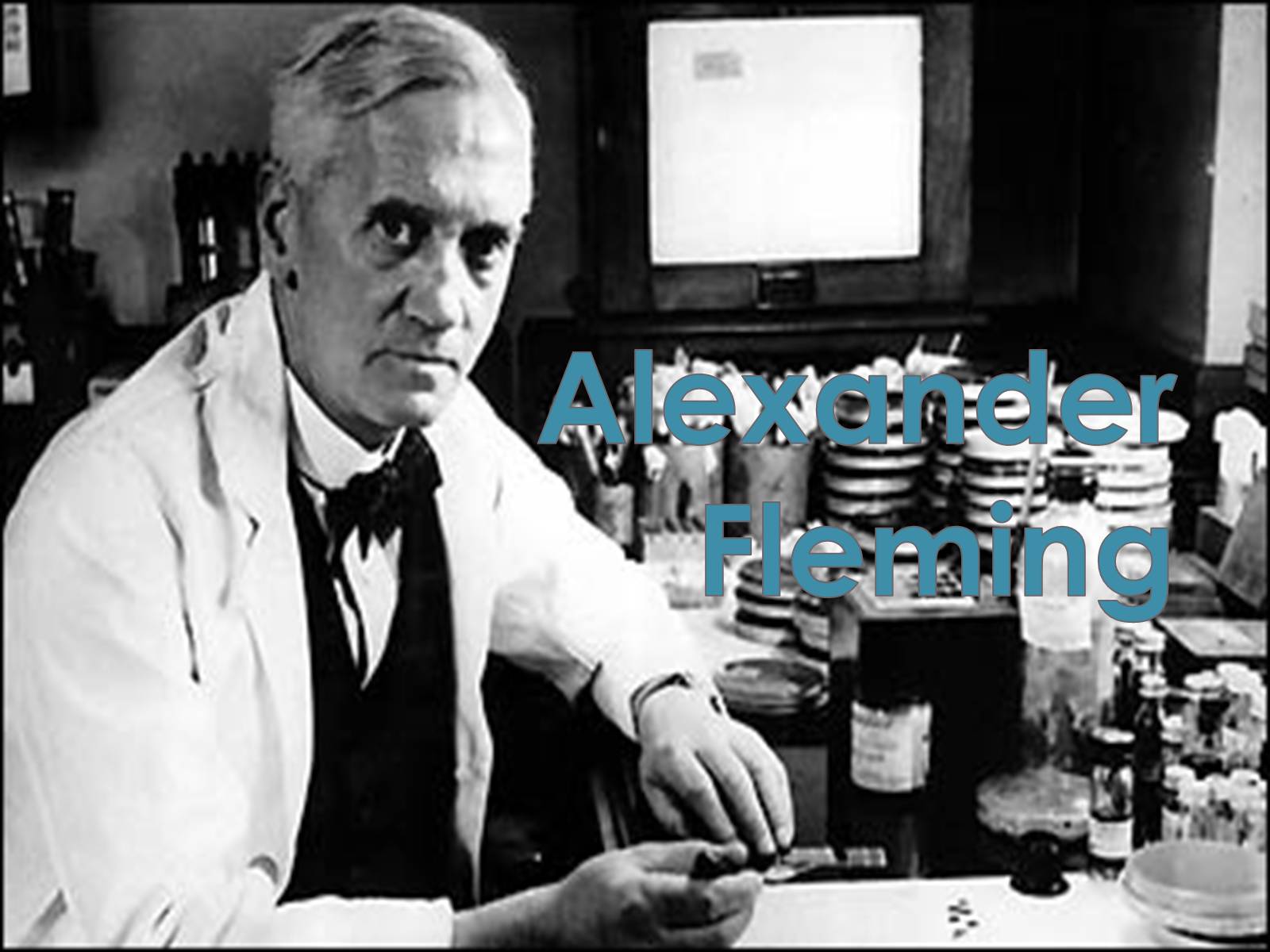
Слайд #2
Introduction
Sir Alexander Fleming (6 August 1881 – 11 March 1955) was a Scottish biologist and pharmacologist. Fleming published many articles on bacteriology, immunology and chemotherapy. His best-known achievements are the discovery of the enzyme lysozymein in 1923 and the antibiotic substance penicillin in 1928, for which he shared the Nobel Prize in Physiology or in 1945 with Howard Walter and Ernst Boris.
Sir Alexander Fleming (6 August 1881 – 11 March 1955) was a Scottish biologist and pharmacologist. Fleming published many articles on bacteriology, immunology and chemotherapy. His best-known achievements are the discovery of the enzyme lysozymein in 1923 and the antibiotic substance penicillin in 1928, for which he shared the Nobel Prize in Physiology or in 1945 with Howard Walter and Ernst Boris.
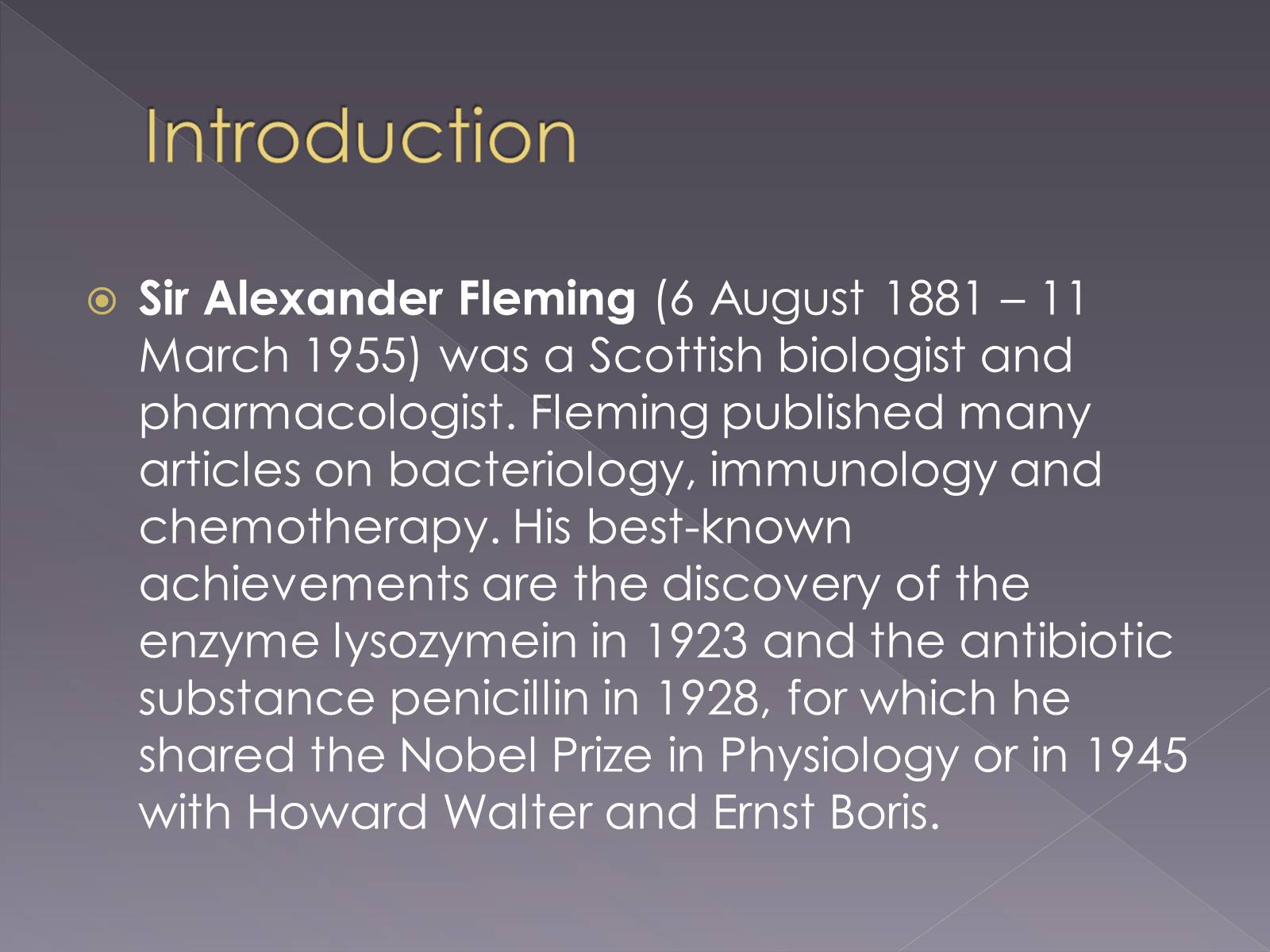
Слайд #3
Biography
Alexander Fleming was born on 6 August 1881 in Lochfield, Britain. It was the third of four children born remarried Hugh Fleming, who died when Alexander was seven. Fleming was, until 1894, a rudimentary education. Thirteenth birthday, he moved to London to live with a brother who exercised there as a physician and completed his education.
Alexander Fleming was born on 6 August 1881 in Lochfield, Britain. It was the third of four children born remarried Hugh Fleming, who died when Alexander was seven. Fleming was, until 1894, a rudimentary education. Thirteenth birthday, he moved to London to live with a brother who exercised there as a physician and completed his education.
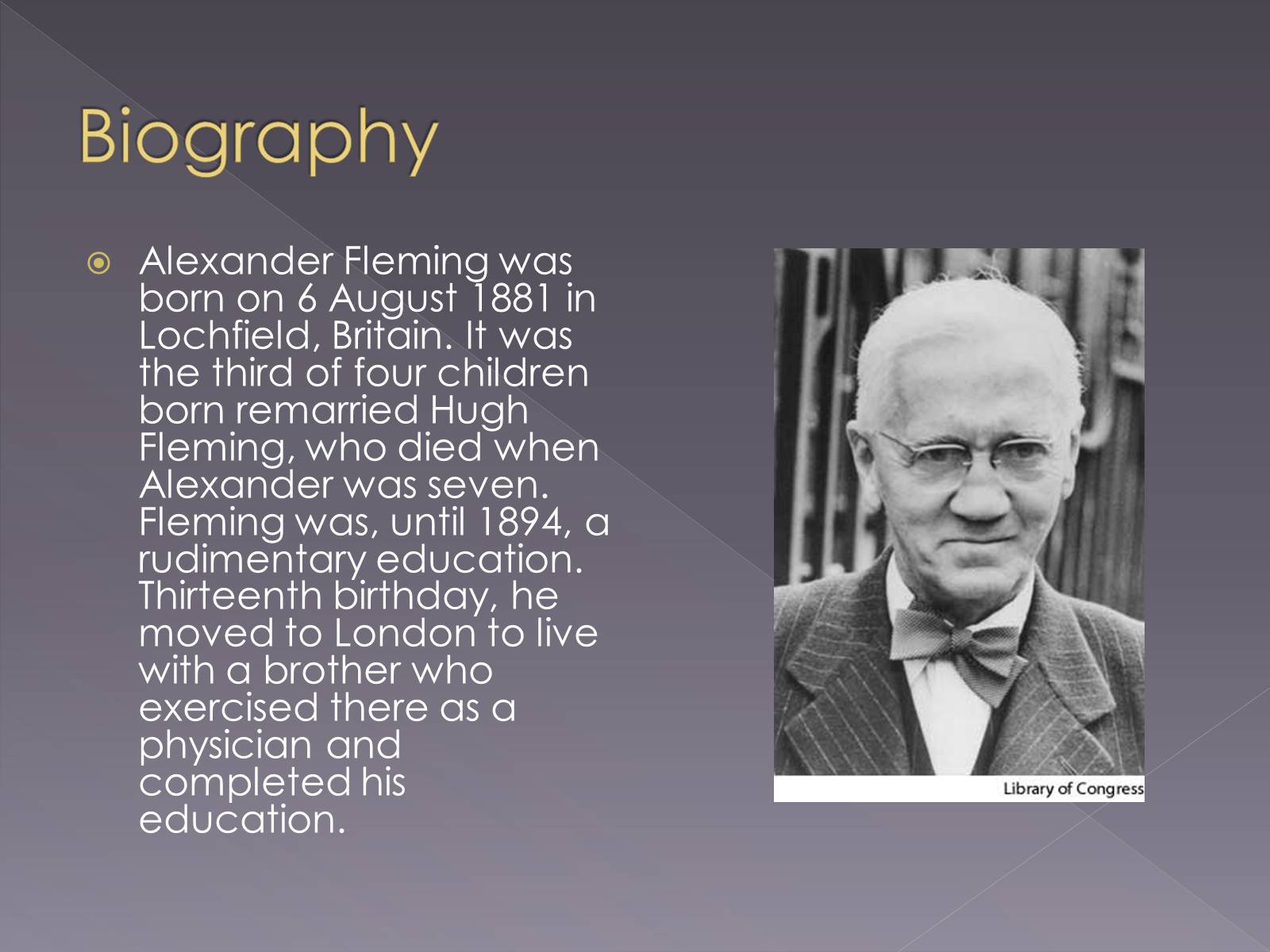
Слайд #4
In 1900 he joined the London Scottish Regiment with the intention of participating in the Boer War, taking part in the First World War as an officer of the Royal Army Medical Corps in France.
At twenty he studied medicine. In 1901 he won a scholarship to St. Mary's Hospital Medical School in Paddington. In 1906 he joined the team of the bacteriologist Sir Almroth Wright for 40 years.
In 1906 He started working at Saint Mary's Hospital in London.|
In 1908 he graduated, winning the gold medal of the University of London. In 1928 he became professor of bacteriology , retiring in 1948.
In 1955, Fleming died suddenly of a heart attack at his residence in London.
At twenty he studied medicine. In 1901 he won a scholarship to St. Mary's Hospital Medical School in Paddington. In 1906 he joined the team of the bacteriologist Sir Almroth Wright for 40 years.
In 1906 He started working at Saint Mary's Hospital in London.|
In 1908 he graduated, winning the gold medal of the University of London. In 1928 he became professor of bacteriology , retiring in 1948.
In 1955, Fleming died suddenly of a heart attack at his residence in London.
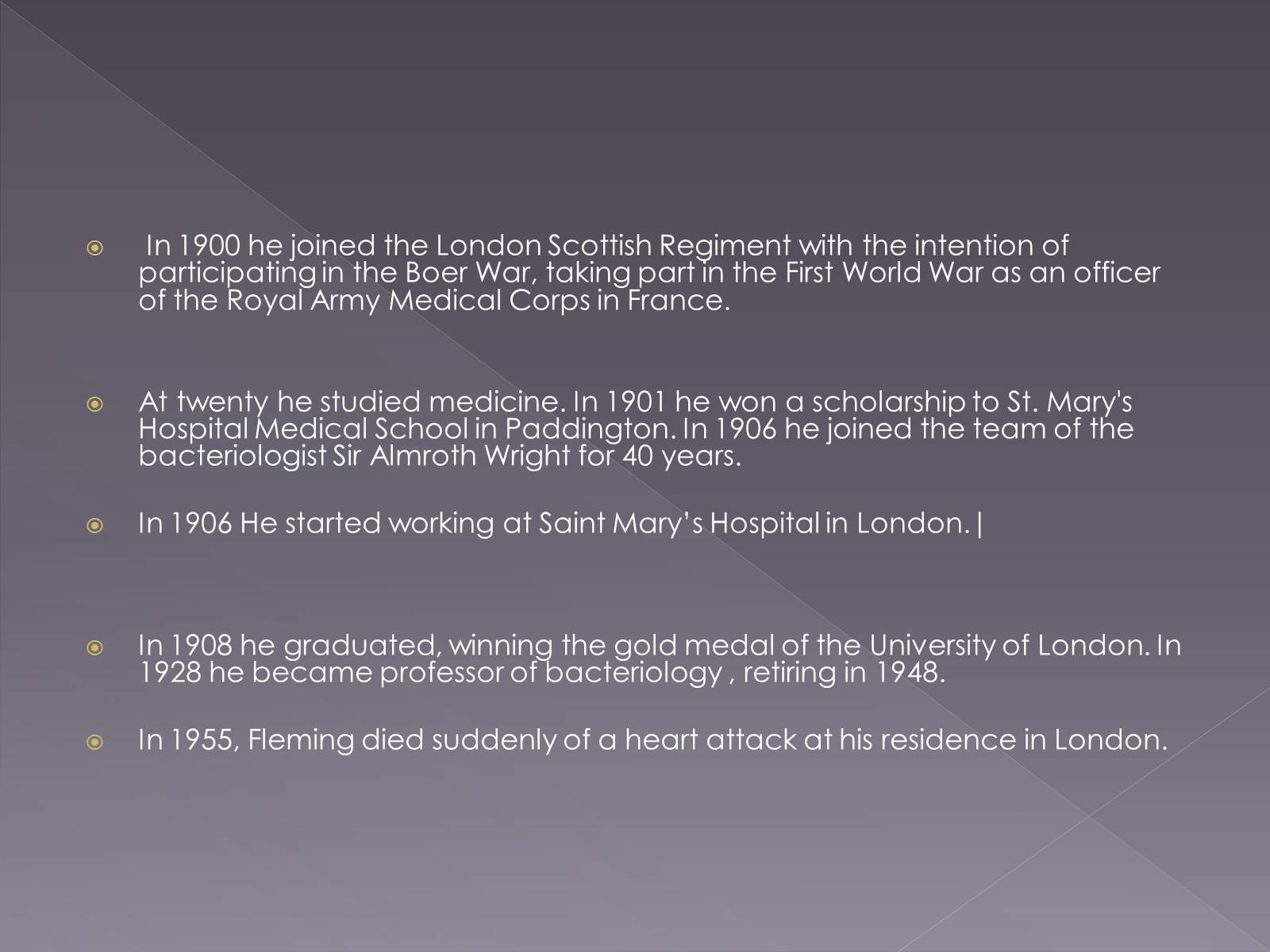
Слайд #5
In 1928 he became professor at the University of London.
In 1945 He got the Nobel Prize in medicine, with H. W. Florey and E. B. Chain.
Fleming's career was devoted to investigating the human body's defenses against bacterial infections. His name is associated with two important discoveries: lysozyme and penicillin.
In 1945 He got the Nobel Prize in medicine, with H. W. Florey and E. B. Chain.
Fleming's career was devoted to investigating the human body's defenses against bacterial infections. His name is associated with two important discoveries: lysozyme and penicillin.
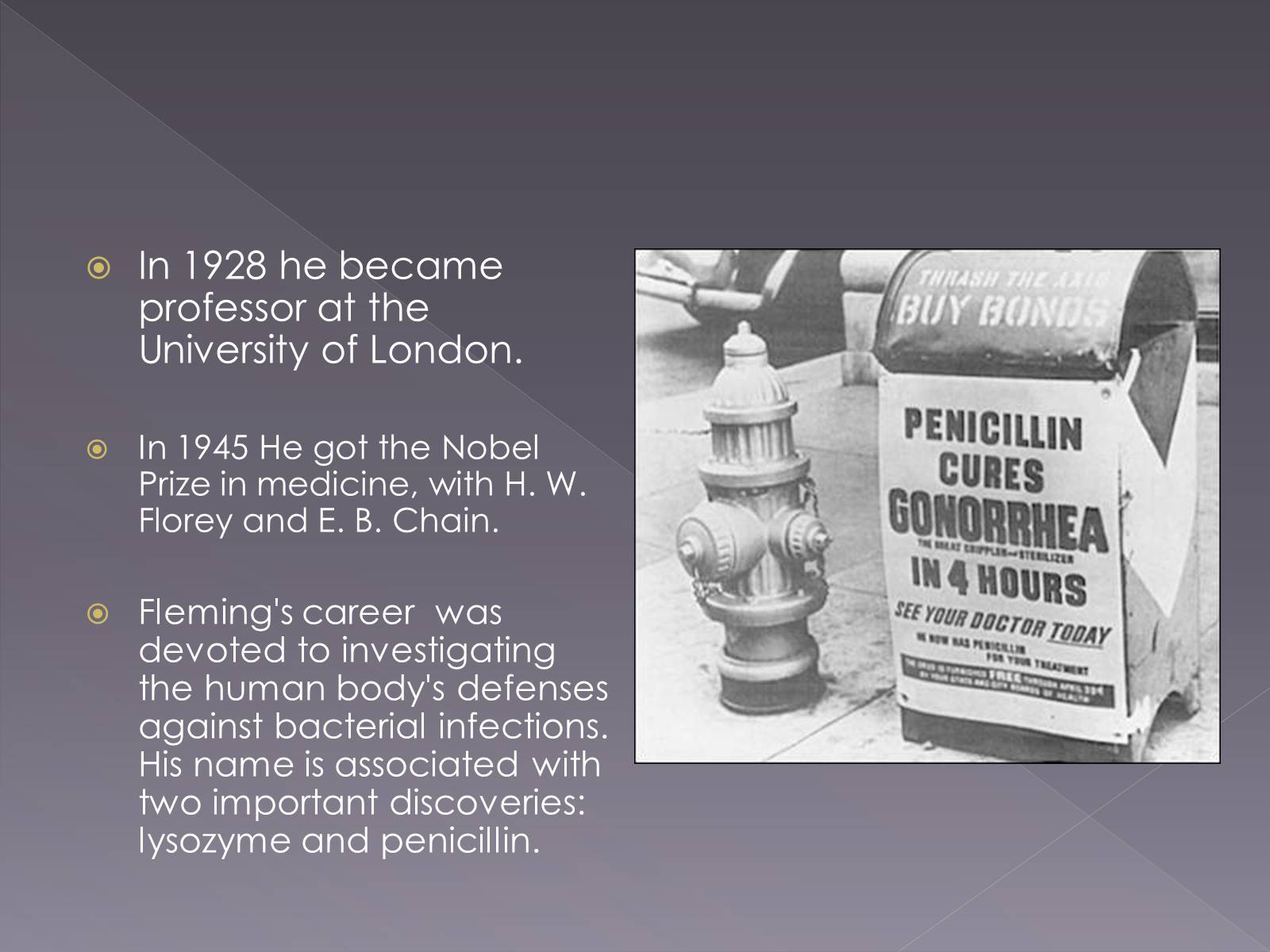
Слайд #6
Important history eventes
1912 : Titanic sinks at 2:20 am, taking with her the lives of more than 1,500 people.
1915: This decade is marked by the First War World which started in 1914 and finished in 1918.
-The formation of the USSR.
1936: The Spanish Civil War started.
1939: End of the Spanish Civil War. It started the dictatorship of Francisco Franco.
-Start of the Second World War.
1912 : Titanic sinks at 2:20 am, taking with her the lives of more than 1,500 people.
1915: This decade is marked by the First War World which started in 1914 and finished in 1918.
-The formation of the USSR.
1936: The Spanish Civil War started.
1939: End of the Spanish Civil War. It started the dictatorship of Francisco Franco.
-Start of the Second World War.
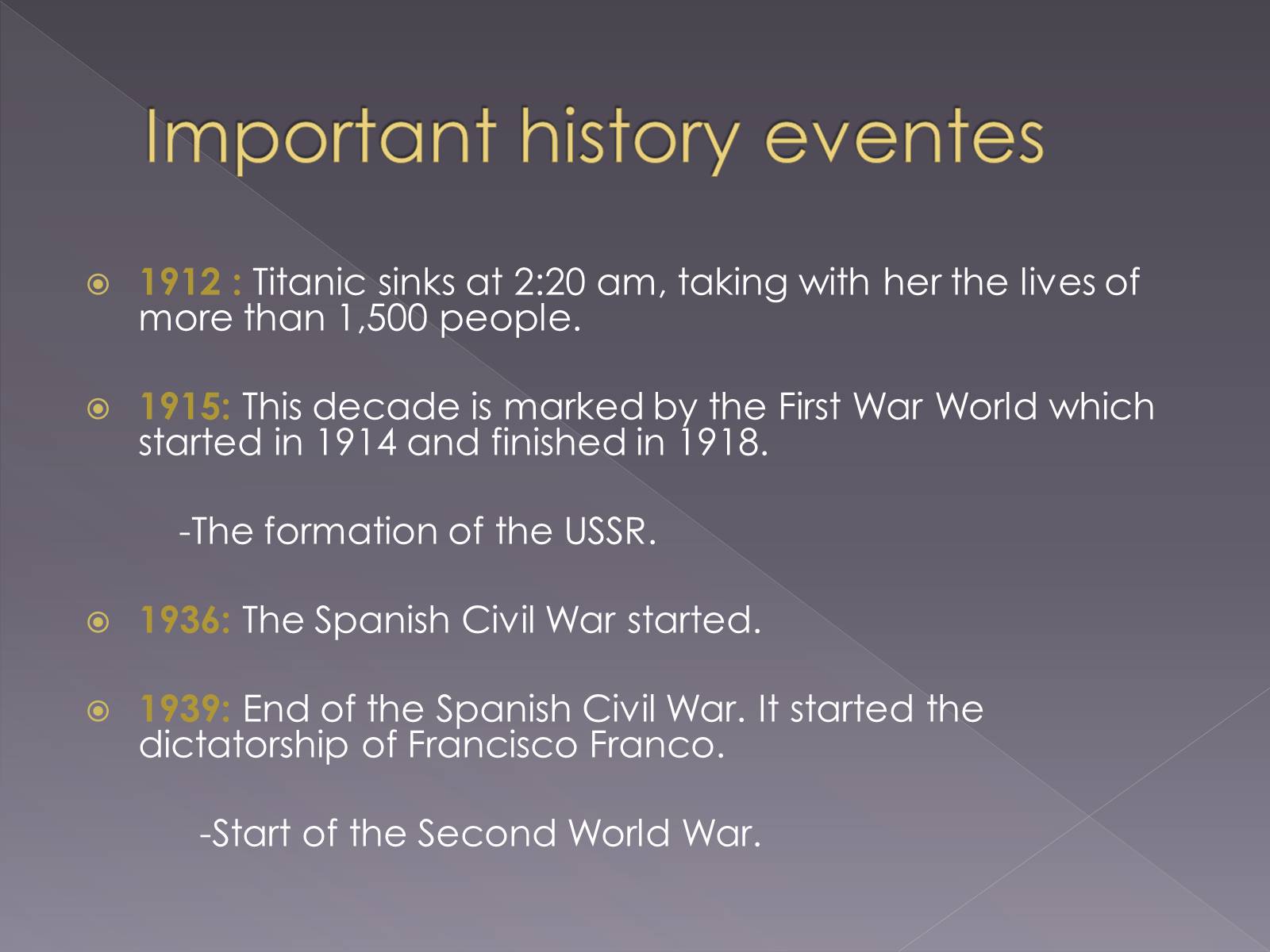
Слайд #7
1941:The Japanese navy attacked Pearl Harbour and U.S.A declared the war against Japan.
1945:Mussolini was executed and Adolf Hitler killed himself.
- U.S.A attacked the cities of hiroshima and nagasaki with atomic bombs.
1955 :Spain went into the U.N.
1945:Mussolini was executed and Adolf Hitler killed himself.
- U.S.A attacked the cities of hiroshima and nagasaki with atomic bombs.
1955 :Spain went into the U.N.
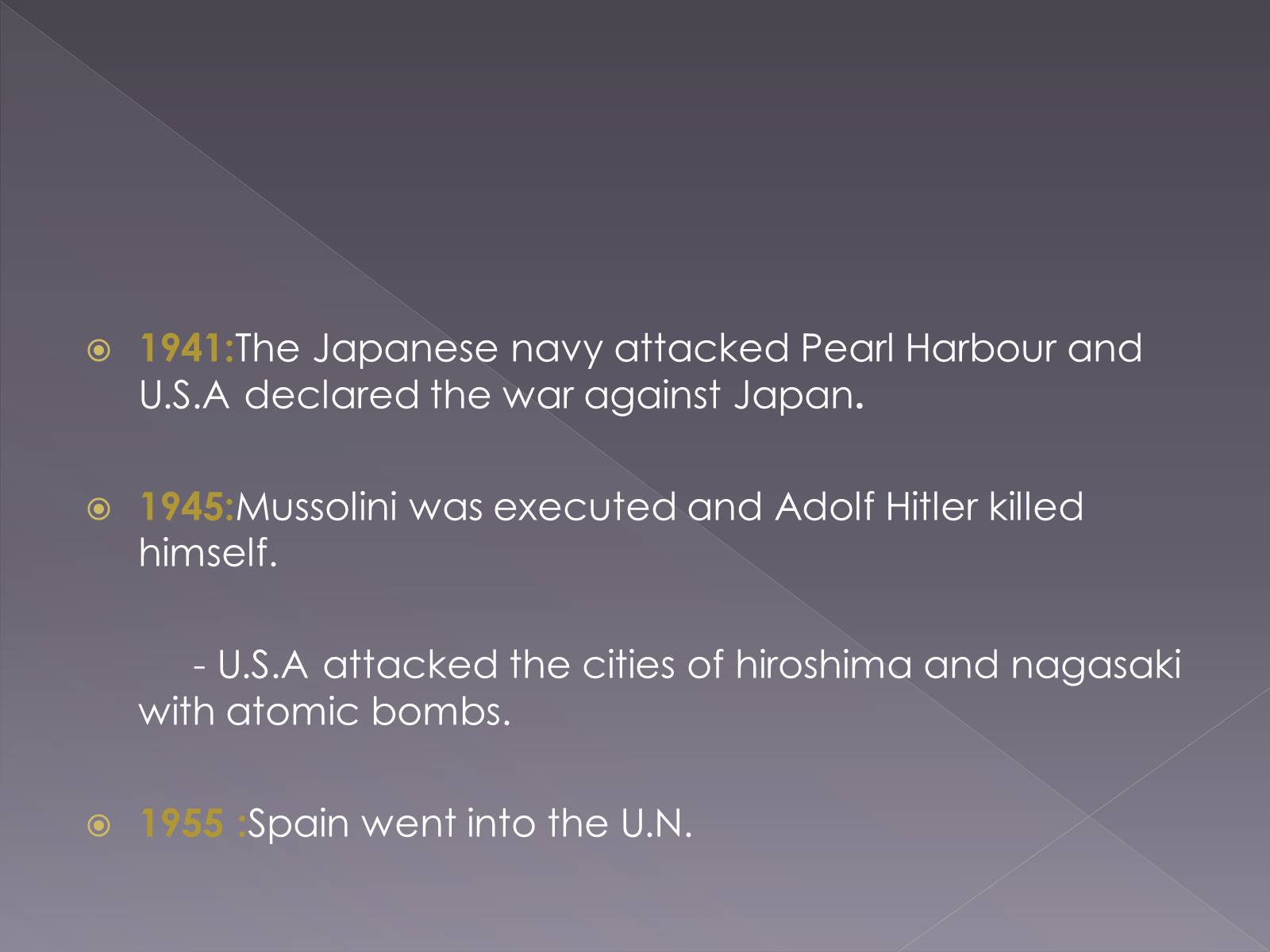
Слайд #8
Famous people at that time
Politics:
Manuel Azaña( Second president of the Spanish Republic).
Adolf Hitler (German dictator).
Francisco Franco(Spanish dictator).
Benito Mussolini(Italian dictator).
Franklin D. Roosevelt( president of U.S .A).
Literature:
Oscar Wilde
Pablo Gargallo.
Juan Ramón Jimenez.
Art:
Pablo Picasso.
Dali Salvador
Politics:
Manuel Azaña( Second president of the Spanish Republic).
Adolf Hitler (German dictator).
Francisco Franco(Spanish dictator).
Benito Mussolini(Italian dictator).
Franklin D. Roosevelt( president of U.S .A).
Literature:
Oscar Wilde
Pablo Gargallo.
Juan Ramón Jimenez.
Art:
Pablo Picasso.
Dali Salvador
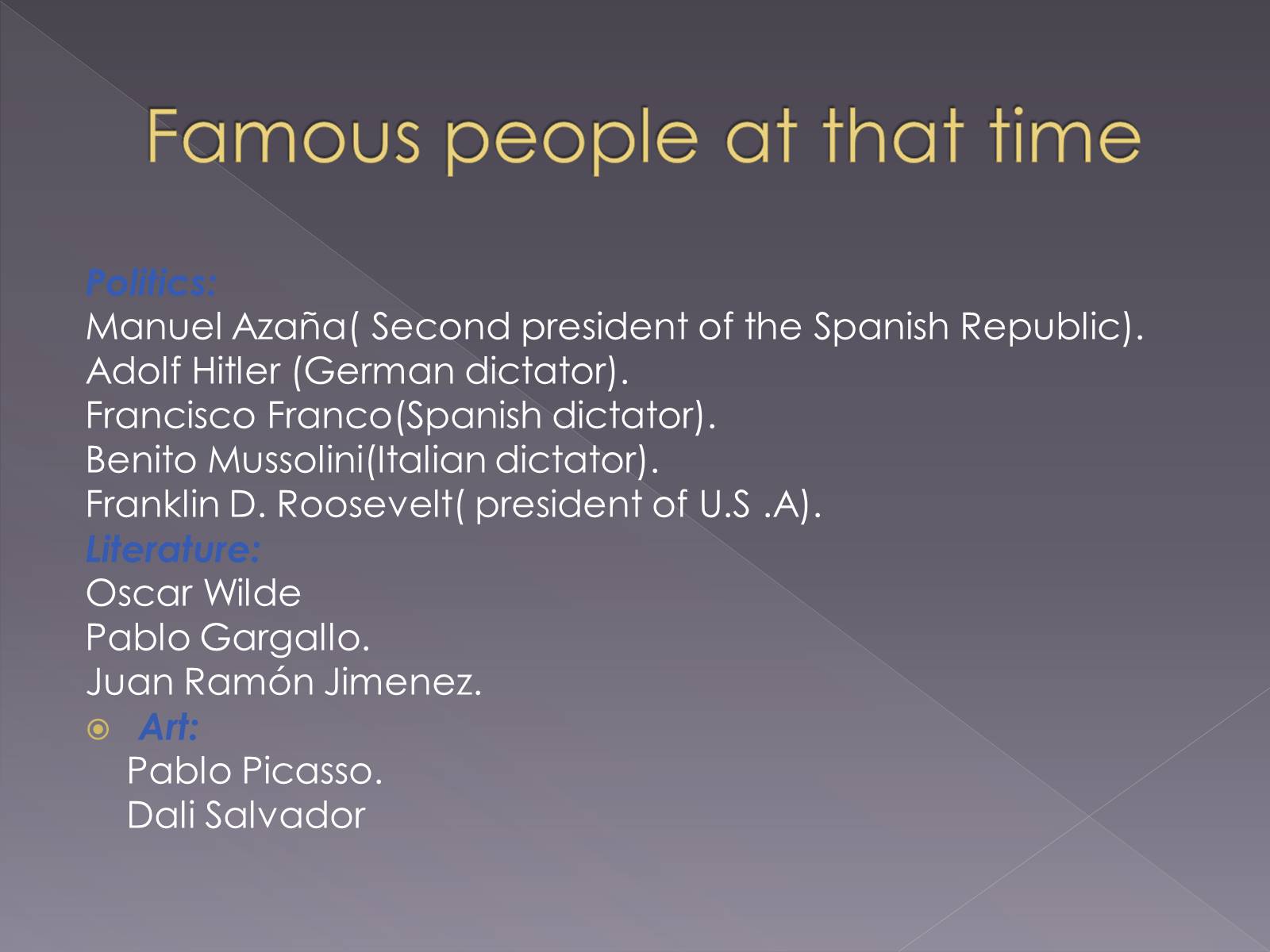
Слайд #9
Music:
Claude Debussy .
Richard Strauss.
Manuel de Falla .
Movies and actors:
Charlie Chaplin.
King Kong.
Casablanca.
Science:
Albert Einstein.
Alexander Fleming.
Wener Heisenberg.
Claude Debussy .
Richard Strauss.
Manuel de Falla .
Movies and actors:
Charlie Chaplin.
King Kong.
Casablanca.
Science:
Albert Einstein.
Alexander Fleming.
Wener Heisenberg.
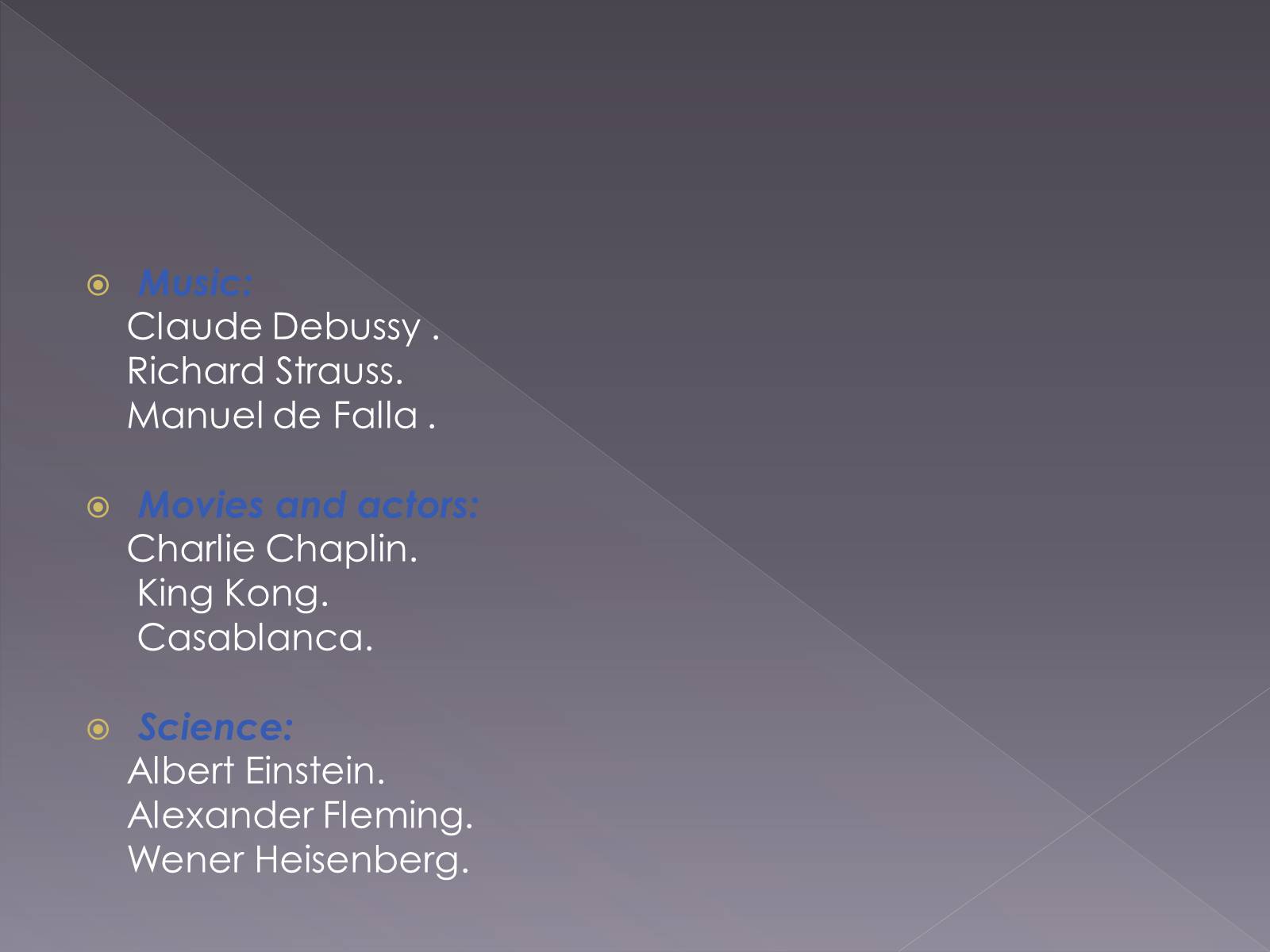
Слайд #10
Discovers
Alexander Fleming is famous because of the discovery of penicillin, an antibiotic that revolutionized modern medicine.
In 1923, Fleming discovered a substance called lysozyme bacteriolytic in tissues and secretions.
In 1928, he discovered a substance called penicillin antibiotic that became one of the most powerful discoveries to treat any bacterial infections today
Alexander Fleming is famous because of the discovery of penicillin, an antibiotic that revolutionized modern medicine.
In 1923, Fleming discovered a substance called lysozyme bacteriolytic in tissues and secretions.
In 1928, he discovered a substance called penicillin antibiotic that became one of the most powerful discoveries to treat any bacterial infections today
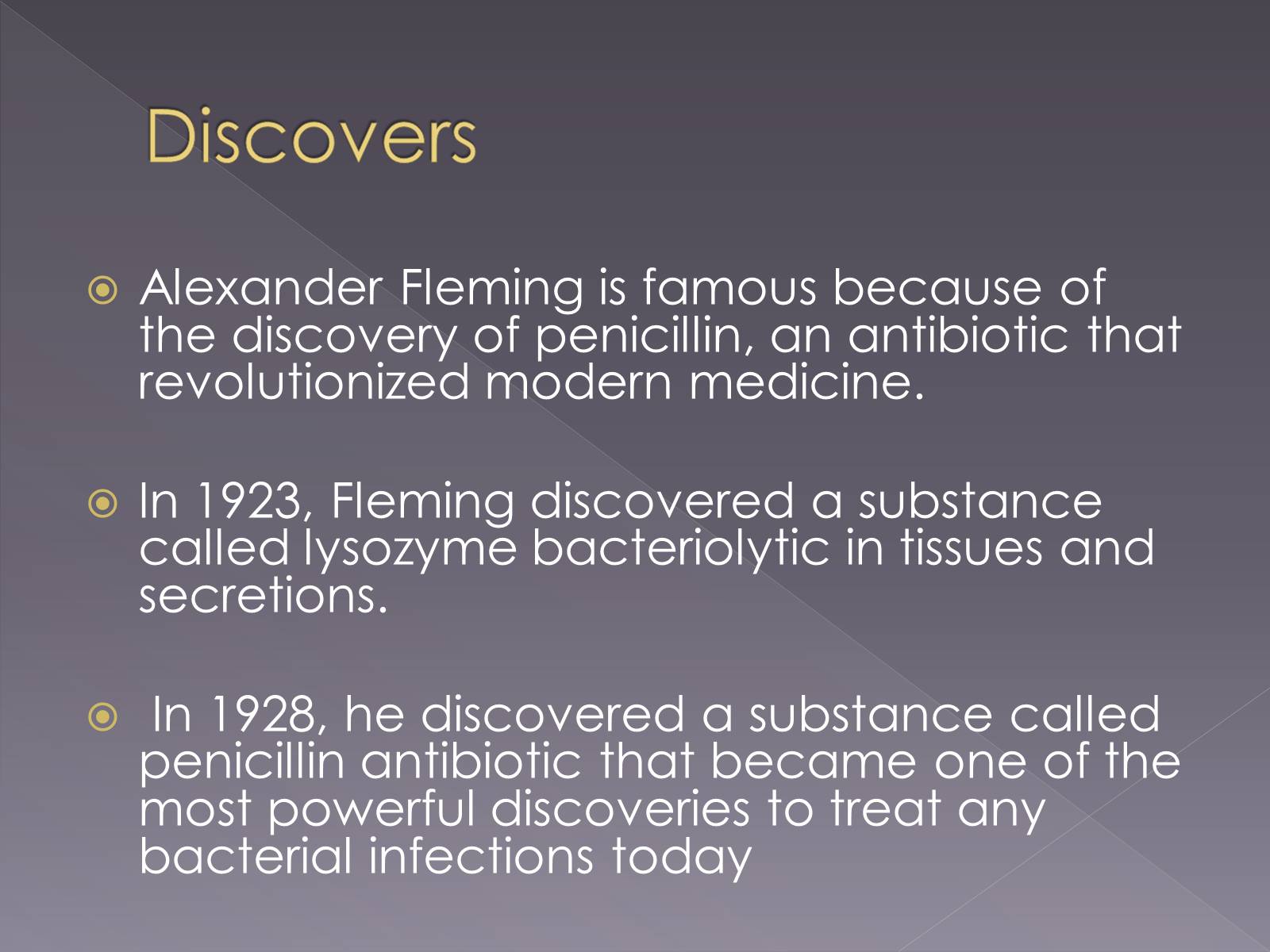
Слайд #11
In 1945, he shared the Nobel Prize for the discovery of penicillin in conjunction with Howard Walter Florey and Ernst Boris Chain
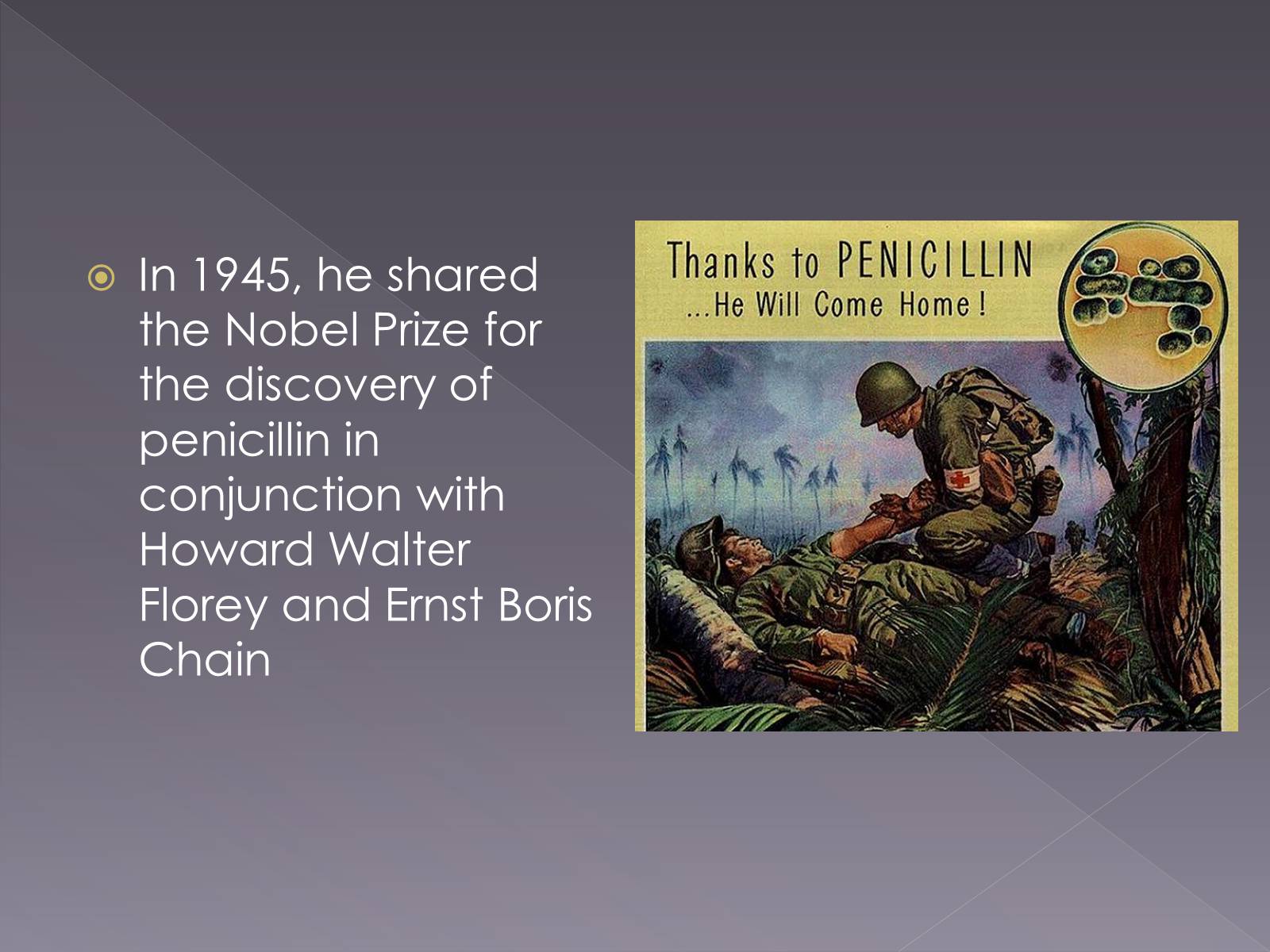
Слайд #12
In Spain:
On 10 March 1944, the fist two doses of penicillin in Spain were administered.
Just before the spring of 1944, one engineer of Coruña and a girl of 9 years old from Madrid were waiting for the penicillin to come from Rio de Janeiro because it was the only possibility to salve they lives.
The antibiotic for the engineer and the girl come on plane from rio de Janeiro but in the 2 cases the antibiotic didn't has any effect and they died.In this situation the doctors wants to increase the production of the antibiotic to meet the enormous demand that exists.
On 10 March 1944, the fist two doses of penicillin in Spain were administered.
Just before the spring of 1944, one engineer of Coruña and a girl of 9 years old from Madrid were waiting for the penicillin to come from Rio de Janeiro because it was the only possibility to salve they lives.
The antibiotic for the engineer and the girl come on plane from rio de Janeiro but in the 2 cases the antibiotic didn't has any effect and they died.In this situation the doctors wants to increase the production of the antibiotic to meet the enormous demand that exists.
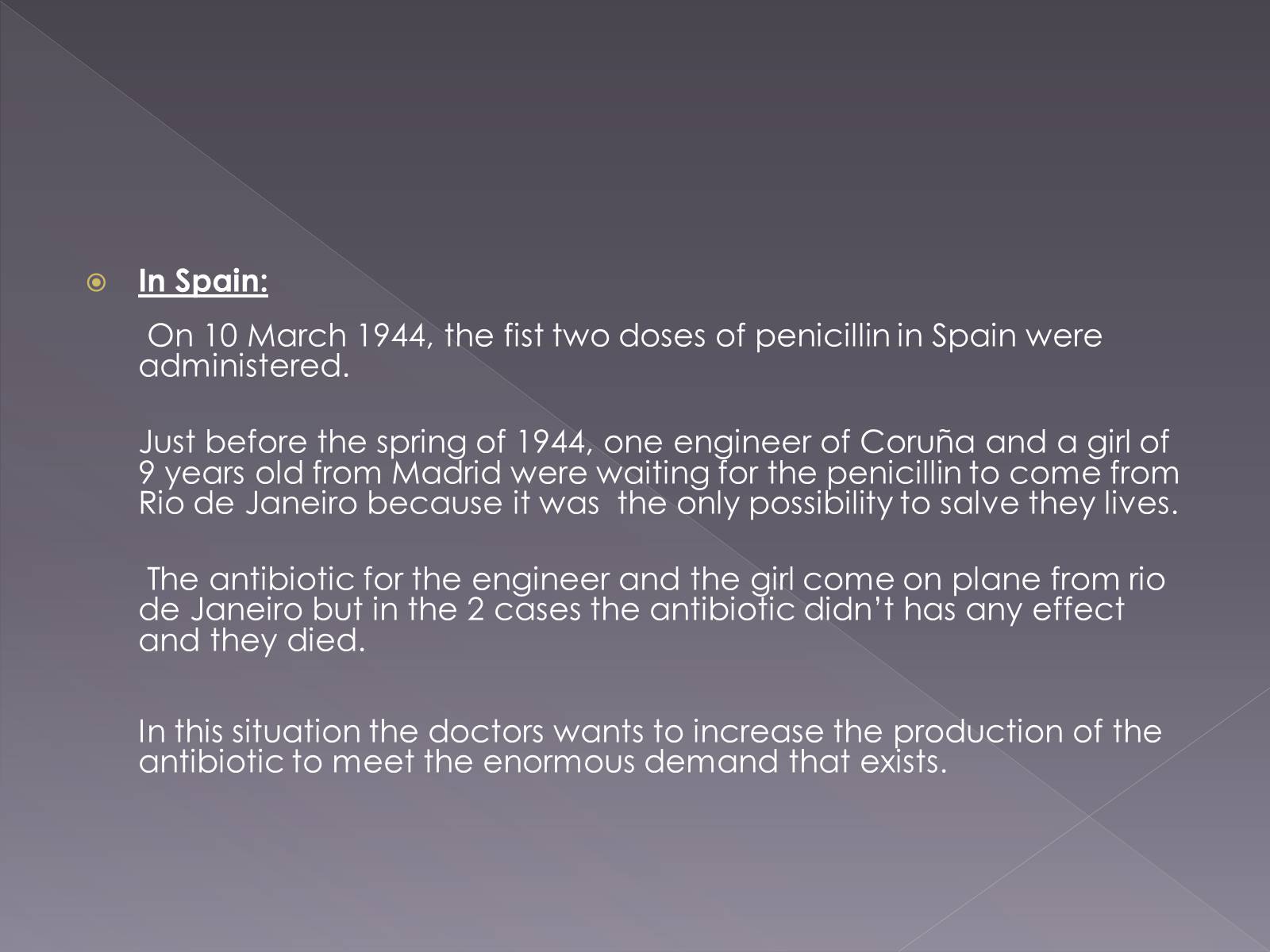
Слайд #13
Bibliography
Wikipedia.
http://www.arrakis.es/~alfius/music00.htm
Wikipedia.
http://www.arrakis.es/~alfius/music00.htm
